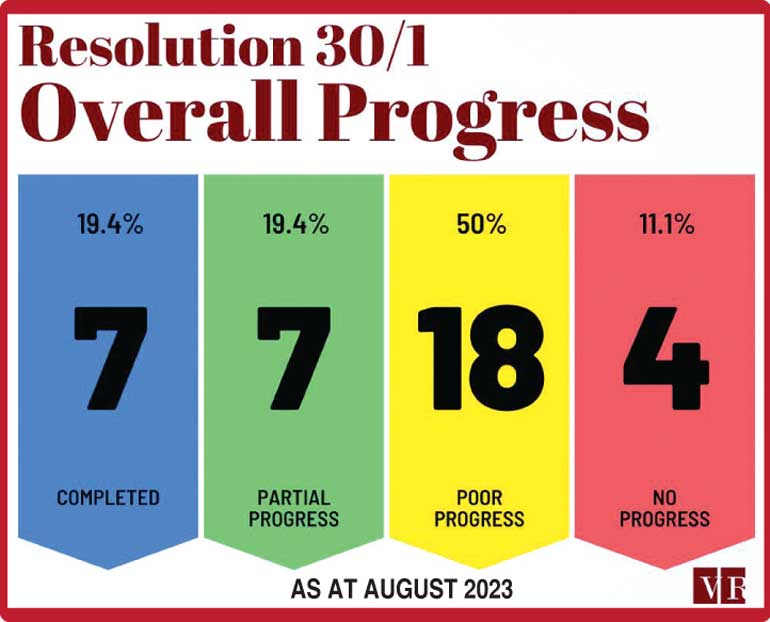Tuesday Feb 17, 2026
Tuesday Feb 17, 2026
Wednesday, 13 September 2023 00:22 - - {{hitsCtrl.values.hits}}

Sri Lanka has completed 19.4% of the measures it committed to implement under the United Nations Human Rights Council (UNHRC) resolution 30/1 as of August 2023, according to the UNHRC Monitor published by Verité Research yesterday.
However, 61.1% of the commitments in the resolution – which was co-sponsored by Sri Lanka – have seen ‘poor’ or ‘no’ progress, eight years since it was adopted in October 2015.
The ‘UNHRC Monitor’ of Verité Research is the first and only monitor of its kind which objectively tracks the implementation of Resolution 30/1. A written update on Sri Lanka is scheduled to be delivered at the 54th Regular Session of the UNHRC on 11 September 2023.
Resolution 30/1 contained 36 distinct actionable commitments.
Of these commitments, 7 (19.4%) are classified in the UNHRC Monitor as ‘complete’, 7 as ‘partial progress’ (19.4%), 18 as ‘poor progress’ (50%), and 4 as ‘no progress’ (11.1%).
These commitments fall into five broad thematic categories: rights and rule of law (15 commitments), transitional justice and reconciliation (9), security and demilitarisation (7), international engagement (3) and power-sharing (2).
The seven completed commitments are:
1. Engage in broad transitional justice processes
2. Establish the Office on Missing Persons
3. Establish the Office for Reparations
4. Sign and ratify the International Convention for the Protection of All Persons from Enforced Disappearances
5. Criminalise enforced disappearances
6. Continue engagement between the Government of Sri Lanka and the OHCHR
7. Cooperate with special procedure mandate holders.
Seven commitments remain partially fulfilled, including
1. Publishing previous presidential commission reports
2. Issue Certificates of Absence to families of missing persons.
Some of the key commitments which remain at ‘poor progress’ since 2015 are:
1. Restore normality to civilian life
2. Investigate attacks on journalists, human rights defenders, religious minorities, and civil society
3. Hold perpetrators of these attacks to account
4. Prevent such attacks in the future
The commitment to set up a judicial mechanism with a special counsel and foreign participation, to investigate violations of human rights and international humanitarian law has remained at ‘no progress’ since February 2018. Since 2015, successive governments have also not made any progress on the commitment to review the Public Security Ordinance.
At the 34th UNHRC session held in March 2017, the Sri Lankan Government co-sponsored resolution 34/1 - which reaffirmed the Resolution 30/1 commitments. At the 40th session in March 2019, the Government co-sponsored Resolution 40/1, which also reaffirmed its commitments to reconciliation envisaged in Resolution 30/1.
However, in February 2020, the Sri Lankan Government informed the Office of the High Commissioner for Human Rights (OHCHR) of its decision to withdraw from co-sponsorship of Resolution 40/1 of 2019, and its preceding resolutions 34/1 of March 2017, and 30/1 of October 2015.
Verité Research has released analyses of progress in fulfilling the commitments in Resolution 30/1 in June 2016, March 2017, February 2018, March 2019, February 2020, February 2021, March 2022, February 2023 and August 2023. These analyses can be accessed at www.veriteresearch.org/?s=resolution+30%2F1.